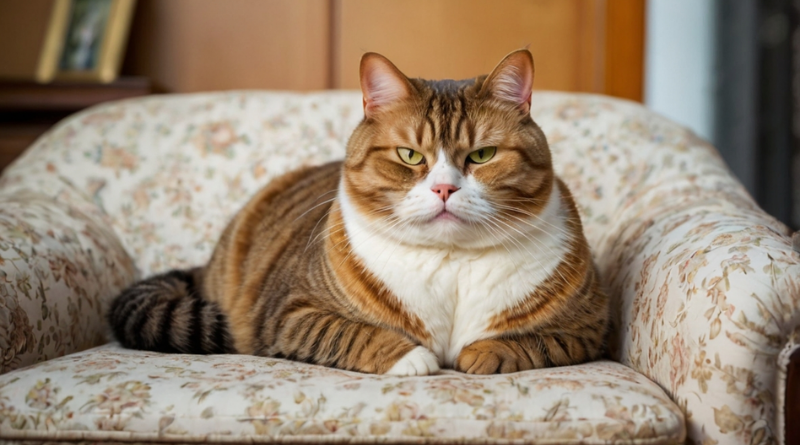Cats come in all shapes and sizes, but maintaining a healthy weight is crucial for their well-being. While some fluffiness is natural, signs your cat might be overweight can lead to serious health problems for your feline friend. Recognizing the signs early can prevent further health complications and ensure your cat leads a happy, active life. Here are some key signs to help you determine if your cat might be overweight.
Difficulty Feeling Ribs – Signs Your Cat Might Be Overweight
A healthy cat’s ribs should be easily felt with a gentle touch. If you need to press hard to feel their ribs, your cat may have excess fat covering them. This is one of the first indicators of being overweight. Regularly checking your cat’s rib area can help you stay on top of their weight changes over time.
Lack of a Visible Waistline
When viewed from above, a healthy cat should have a noticeable waistline between their ribcage and hips. If your cat looks more oval-shaped or has no defined waist, it could be a sign of obesity. The waistline test is an easy visual cue that can quickly alert you to potential weight issues.
Fat Pouch Under the Belly
Many cats have a small primordial pouch, which is normal. However, if the pouch is excessively large or hangs low, it may indicate that your cat is carrying too much weight. This extra fat not only affects their appearance but can also make it harder for them to move around comfortably.
Difficulty Grooming Themselves
Overweight cats often struggle to groom themselves properly. If you notice matted fur or an unkempt coat, especially around hard-to-reach areas like their back or tail, weight might be a contributing factor. Grooming is a natural behavior for cats, and any difficulty in doing so can impact their hygiene and overall comfort.
Reduced Mobility or Activity Levels
Has your cat become less playful or hesitant to jump onto furniture? Excess weight can put strain on their joints, leading to reduced mobility and energy levels. This can create a cycle where less activity leads to further weight gain, so it’s important to address the issue early.
Heavy Breathing Without Exercise
Cats usually breathe quietly and evenly. If your cat pants or breathes heavily without engaging in vigorous activity, it could be due to excess weight putting pressure on their respiratory system. This symptom can also indicate underlying health issues that need immediate attention.
Frequent Visits to the Vet for Health Issues
Overweight cats are more prone to health problems such as diabetes, arthritis, and heart disease. If your cat has recurring health issues, their weight could be a contributing factor. Regular veterinary check-ups can help you monitor your cat’s overall health and address weight-related concerns promptly.
What to Do If Your Cat Is Overweight
If you suspect your cat is overweight, consult your veterinarian for a proper diagnosis and guidance. They can recommend a tailored diet and exercise plan to help your cat achieve a healthier weight. Here are some general tips:
- Measure Food Portions: Overfeeding is a common cause of weight gain. Follow your vet’s recommendations for proper portion sizes. Using a kitchen scale to measure your cat’s food can ensure accuracy and prevent accidental overfeeding.
- Engage in Playtime: Use toys and interactive games to encourage your cat to move more. Laser pointers, feather wands, and treat-dispensing toys are great options to keep your cat active and entertained.
- Choose Nutrient-Dense Foods: Opt for high-quality cat food with balanced nutrients to support weight loss without sacrificing nutrition. Look for formulas specifically designed for weight management.
- Establish a Routine: Consistency is key. Set regular feeding times and play sessions to help your cat adapt to a healthier lifestyle.
- Monitor Progress: Keep track of your cat’s weight and behavior over time. Celebrate small milestones, but remain patient, as weight loss in cats should be gradual to avoid health risks.
Conclusion
Monitoring your cat’s weight is essential for their overall health and happiness. By recognizing these signs and taking proactive steps, you can help your feline companion live a longer, healthier life. Remember, always consult your veterinarian before making significant changes to your cat’s diet or lifestyle. Prevention and early intervention are the best ways to ensure your cat stays fit and thriving.
References:

